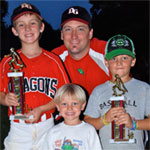How to Manage a Game
Probably the most scrutinized aspect of coaching is how much does a good manager affect the outcome of the game? Managers play a critical role in all phases of the game; from the lineup to making all position changes to strategy.
The first part of managing the game is getting your kids in the right frame of mind beforehand. Get them focused on the task at hand. Second, know as much as you can about your opponent. If you can, know whether a lefty or righty is the starting pitcher, this may change your lineup placement. Third, put the kids in positions where they will have the most success. These three key elements will play important roles on how you manage your game.
The biggest part of game management is going to be how you handle your pitching staff. Make sure you have pitchers on appropriate pitch counts and pay special attention to the weather conditions and how the kids look. In the hot summer months, kids can overheat fast and lose their stuff in a hurry. Keep an eye on pitch location, velocity, mechanics and keep them well hydrated.
In terms of strategy, know your teams’ strengths and weaknesses. Are we a team that runs better, hits for power better, plays small ball better? Your in-game strategy relies on understanding both your team and your opponent. Gather as much information before the game as you can. Watch opponents’ infield/outfield pre-game and know who has the strong arms. By understanding your opponent and your team, you will be well more qualified to make game changing decisions on the fly during the game.
Keep the kids on the bench involved in the game. They will soon have their turn to play and need to know the game situation. Address all mistakes quickly and make corrections immediately. Unless it is a mistake that affects team play, take player aside and correct. No one likes to get blasted in front of his teammates.
Lastly, try and have some help. There are a lot of things going on that you need to be aware of. Have someone on scorebook, another tallying pitch counts, an assistant who can help correct mistakes, another who can help with tournament rules, etc. The better the help, the easier the job and the better decisions you can make.

